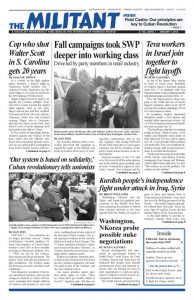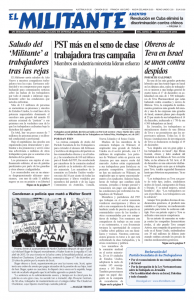January 8, 1993
Washington is moving close to active military intervention in the former Yugoslavia. The ruling families of the United States, Germany, Britain and France are seeking to intervene to put their stamp on the outcome of events.
The last thing the people of former Yugoslavia need is imperialist military intervention. In the past they have fought to overcome national divisions and unite to advance their own interests, including against Nazi occupation in the 1940s.
From the beginning of the carnage a year and a half ago, layers of the working class in Yugoslavia have resisted the slaughter. Working people around the world should demand an end to the economic sanctions against Serbia, as well as the arms embargo, massive food and medical aid to the besieged people of Bosnia.
January 1, 1968
The organizers of the boycott by Black athletes of the 1968 Olympics have drawn up a list of demands which must be met before they will call off the boycott.
The demands include: 1) Reinstatement of Muhammad Ali as world boxing champ; 2) No competition between the United States teams and the “lily-white” teams of South Africa and Southern Rhodesia; 3) An end to the discrimination against Black people and Jews by the New York Athletic Club;
4) Appointment of an additional Afro-American coach to the U.S. Olympic team; 5) Appointment of a Black person to the U.S. Olympic Committee and; 6) Resignation or ouster of Avery Brundage, the President of the International Olympic Committee.
January 2, 1943
The American ambassador to Bolivia stands accused of having intervened on behalf of the Bolivian bosses against the workers during the strike at the Catavi tin mines in Bolivia.
Ernesto Galarza, chief of the Labor Division of the Pan American Union, stated: “The workers have been demanding for many years the passage of a new labor code which would grant them the right to collective bargaining, freedom of organization, minimum wages, and the payment of wages at least every fifteen days. This code was to have been approved by the Bolivian Congress on December 8. On the days immediately preceding that date, the ambassador communicated to the president of Bolivia the viewpoints of the big mine operators, the object of which was to delay or prevent the improvement of working conditions set forth in the code.”

